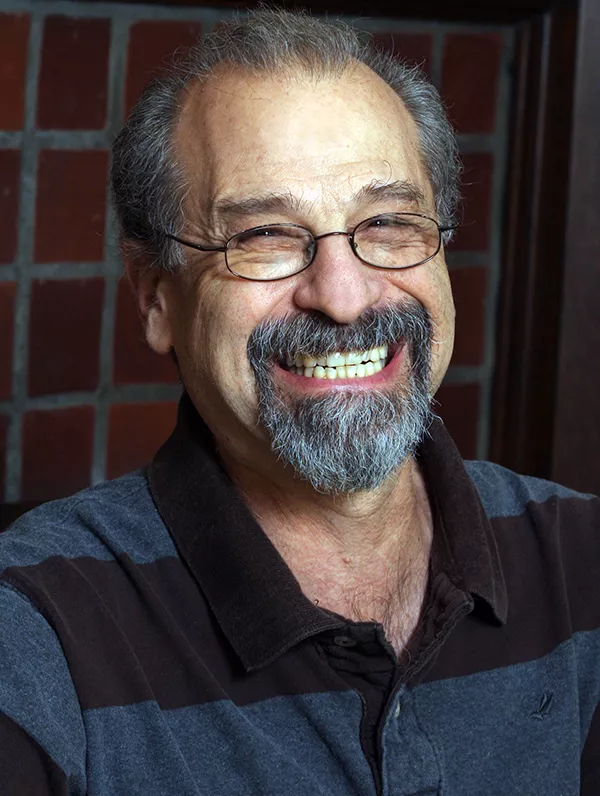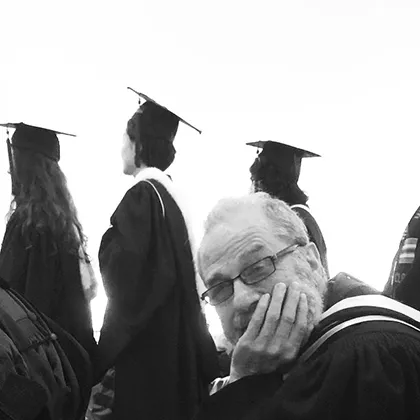
The Department of Literatures in English will host a memorial service for Professor Tratner on Monday, Sept. 20 at 4:30 p.m.; weather permitting, the service will take place on the lawn in front of English House. The below remembrance from President Kim Cassidy was sent to the Bryn Mawr community on Monday, Sept. 13.
Dear Students, Faculty, and Staff:
I write to share a longer remembrance of Michael Tratner, Mary E. Garrett Alumnae Professor of English, who passed away on August 27 following a long illness. Michael touched the lives of so many of us in the Bryn Mawr community and I know that the community is grieving from this terrible loss.
Michael earned his B.A. (in Mathematics) from Harvard, his MA (from the Committee on the Analysis of Ideas and the Study of Methods) from the University of Chicago, and his Ph.D. in English from the University of California at Berkeley. This range of fields is suggestive of the expansiveness and creativity of his lifetime of work. His research and teaching centered on 20th century Modernism, but also extended to film, postcolonial literatures, and music, and most of his research explored the relationship of economics and literature. An accomplished scholar, he published four monographs (most recently, the just-released Love and Money: A Literary History of Desires). In the late 1980s he also co-authored Student Writers at Work and in the Company of Other Writers, which remains in print and is now in its third edition.
After teaching at Stanford University for several years, Michael joined the Bryn Mawr faculty in 1997. In the words of one of his colleagues, his popularity as a teacher was “legendary” and his classes were filled to capacity. Describing his teaching, Michael wrote, “I see my role in the classroom as taking what students say in response to literary works or films and then showing them that their comments are already engaged in conversation with broad intellectual contexts and can be expanded by drawing upon literary critical methods, cultural theory, and historical research.” Stapleton Professor of Literatures in English Kate Thomas wrote, “I will always remember him showing a class a manuscript of one of his articles that had suffered a heavy assault from the red pen of an editor. ‘See?’ he was showing students, ‘writing is a process. [ . . . .] Mike proffered his own fallibilities so that students might feel braver about facing their own. He was, in short, a real mensch. With very jazzy shirts.”
Michael sought to continue growing as a teacher throughout his career, and worked with a TLI consultant several years ago when he felt that he needed to find new ways to engage all students and their varied experiences. He relished that learning experience, as did his TLI consultant Mary Brunson. Now a 9th and 10th grade English teacher, Mary said, “I never fathomed that I would work with an established and beloved English Professor and help him create a classroom that was accepting and engaging for all. The work we did together made me believe in my instincts and passion around education.” She was among more than 150 students who wrote to Michael upon learning of his illness to share the impact he had on them.
Michael was a mentor to younger faculty in the Department of Literatures in English and engaged colleague, in both formal and informal settings. Department Chair Jamie Taylor writes, “My favorite moments with Mike were what I call pop-ups—he’d pop by my office, or into the kitchenette, and we’d just chat about what we were working on. Normally, this would be small talk, but with Mike, every single time, I’d come away with renewed excitement, a new angle on an idea, or a new thing to try in class. Mike’s gift was to see the glimmer of a thought and help you spin it into gold. He didn’t do it on purpose, really. He just found the innovation and excitement and went with it, taking you with him. [ . . . .] He helped me trust my ideas, to pursue them without judgment and with verve. I’m a better scholar and teacher because of him, mostly through these unplanned, casual pop-ups that were as fun as they were illuminating. He brought fun into this intellectual world, and he reminded us to try to do what we do with joy.”
Michael also contributed extraordinary service to the College as a whole. Bethany Schneider, Associate Professor of Literatures in English, describes his “leadership of the department and in the college in general [as] a model of ethical and often radical vision and action.” Among his many roles on campus, he served as chair of the Department of Literatures in English from 1999-2005, on the Committee on Appointments from 2003-2005 (one year as chair), on the Committee on Academic Priorities from 2008-2012, as Chair of Faculty from 2018-2020. I had the pleasure of working with him in many of these roles. Michael brought a powerful combination of skepticism and curiosity to his service. He had strong ideas, but was open to revision and this inspired others to join in that openness. His leadership created the opportunity for constructive change, collaboration and growth. Most importantly Michael saw and appreciated the humanity of others and that was a gift to all of us in challenging times.
Michael’s passion for social justice was manifest in all parts of his life. Michael was an active member of the planning committee for the Community Day of Learning from 2015-2020. Through this work, he became an advocate for a minimum $15/ hour salary for all full-time staff, a goal that the College achieved in May 2020. He was also engaged with the Occupy Movement following the Great Recession, worked on the Free University project with the Philadelphia Free Library, and continued that work with Philadelphia public and charter schools. Kate Thomas recalls, “I loved Mike for his humanity, and the way he would put himself out for others, careless of cost to himself. He believed people—colleagues, students—should be as free and creative as possible, and his exuberant encouragements made you feel less worried and anxious. Michael really cared not one jot for hierarchies and proprieties—he was all about the bigger picture, the spirit of the thing and—above all—reaching towards justice.”
The Department of Literatures in English will host a memorial service for Michael on Monday, Sept. 20 at 4:30; weather permitting, the service will take place on the lawn in front of English House.
I join all of Michael’s colleagues, students, family, and friends in mourning his passing. I close with the words of Nell Anderson, Director of Praxis and Community Partnership Programs: “[Michael’s] energy was wild, his mind, brilliant, and his heart so full of love and adventure.”
Sincerely,
Professor Michael Tratner Looks at a Literary History of Desires

